100 days, thousands dead, millions displaced, billions in destruction, countless lives touched: Russia's war in Ukraine looks less likely to end today than it did when it began on Feb. 24.
The big picture: With the prospect for meaningful peace talks virtually non-existent, the war appears set to continue for weeks or months longer.
Related: The first 100 days of war in Ukraine could be just the beginning
- 100 days on, Russia has largely shifted its focus to the eastern Donbas region after failing to capture the capital Kyiv. Moscow is progressing there, albeit slowly, as the West pumps more weapons into Ukraine.
This is how the war has unfolded until today:
Week 1
Feb. 24 — Russia's invasion begins
- Russian troops move into eastern Ukraine and large explosions are heard in major cities, including Kyiv, moments after Russian President Vladimir Putin announced a "special military operation" in Ukraine.
- Ukrainian President Volodymyr Zelensky vows to stay in Kyiv and declares martial law.
"This might be the last time you see me alive."
Zelensky tells EU leaders in a video conference on Day 1 of the invasion
- Western leaders issue strong condemnation and vow to step up aid to Ukraine. President Biden unveils new sanctions that include sweeping export controls and a freeze on billions of dollars' worth of Russian assets.
"This aggression cannot go unanswered, and if it did, the consequences for America would be much worse. America stands up to bullies. We stand up to freedom."
President Biden on Day 1 of Russia's invasion
Feb. 25 — West hits Putin directly
- The U.S., European Union and United Kingdom issue sanctions against Putin, Russian Foreign Minister Sergei Lavrov and other members of Russia’s Security Council.
- The UN says 50,000 people fled Ukraine in 48 hours.
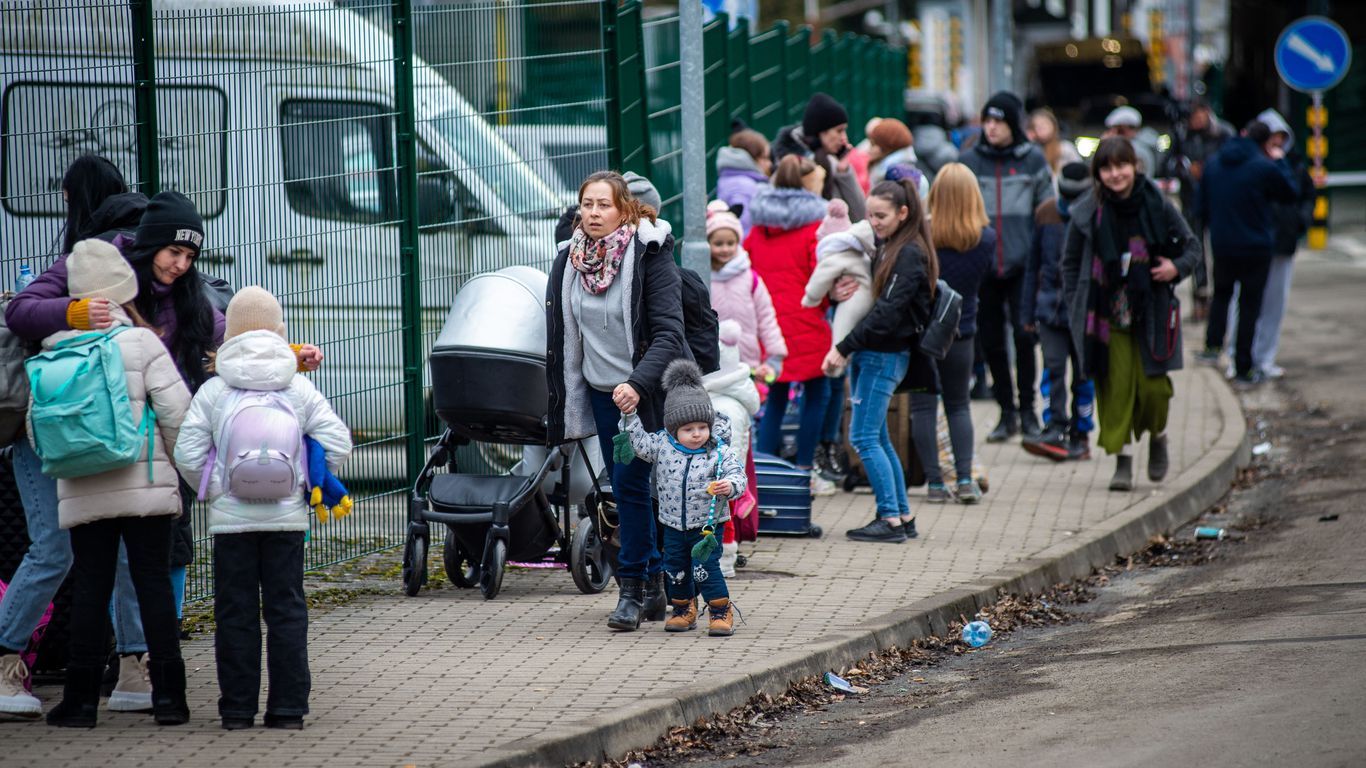
Ukrainian women and children after crossing the Slovak-Ukrainian border into Ubla, eastern Slovakia, in late February. Photo: Peter Lazar/AFP via Getty Images
Feb. 26 — Russian banks cut off
- The EU, U.S. and other Western countries announce they are cutting a "certain number of Russian banks" from the SWIFT international payments system and impose restrictions on Russia’s central bank.
- Germany says it's sending 1,000 anti-tank weapons and 500 Stinger missiles to Ukraine — marking a reversal in Berlin's restrictive arms export policy.
Feb. 27 — Putin puts nuclear deterrent forces on alert
- Putin orders Russia's nuclear deterrent forces on alert.
- Zelensky announces Russia and Ukraine agreed to hold peace talks with "no preconditions" on the Ukrainian-Belarusian border.
- Zelensky says Russia's unprovoked attacks "show signs of genocide."
Feb. 28 — Ukraine and Russia holds talks
- A senior Ukrainian official calls the Russian side in the first round of peace talks "extremely biased."
- The UN says over half a million Ukrainians have fled Ukraine since the invasion began.
- A miles-long convoy of Russian armored vehicles, tanks, towed artillery and logistics support vehicles continues to move toward Kyiv as other major cities suffer heavy shelling.
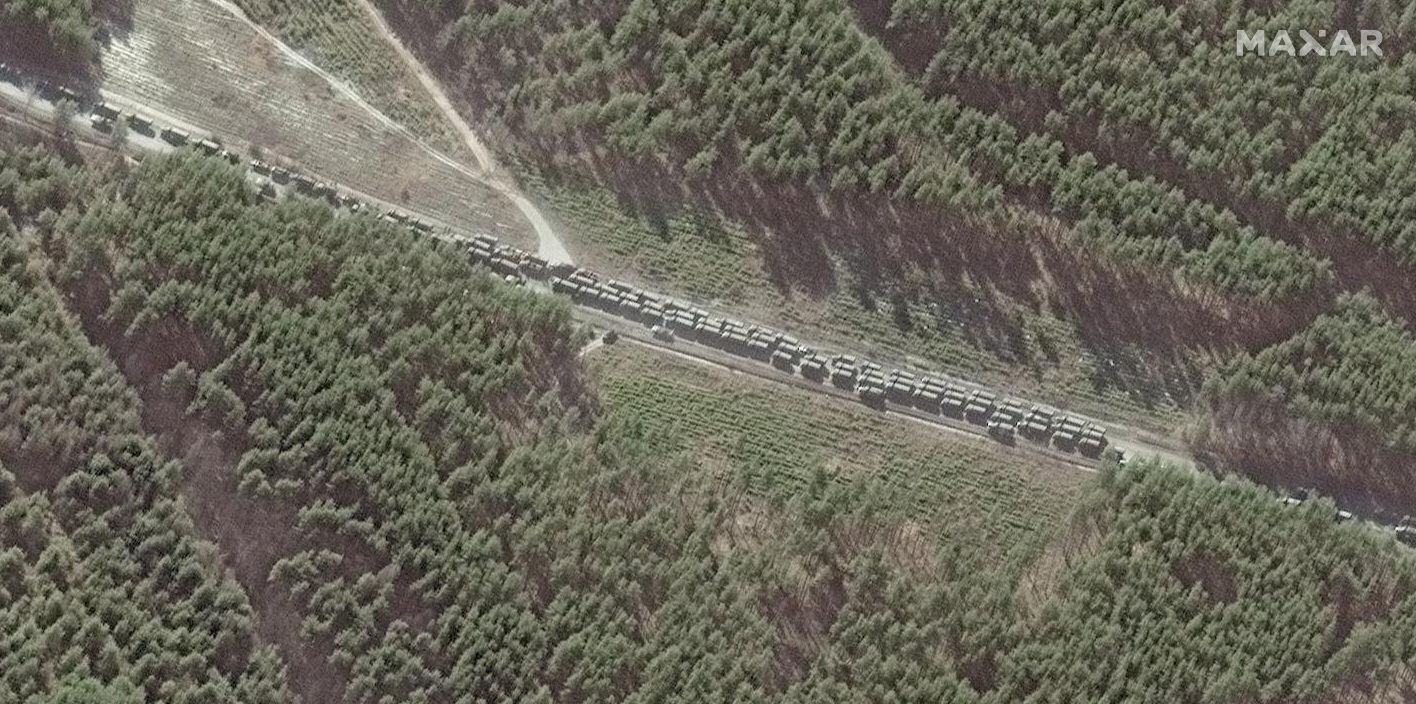
Russian convoy north of Kyiv in late February. Satellite image ©2022 Maxar Technologies
March 1 — Russian strike hits Holocaust memorial site
- Zelensky says a Russian strike damaged the Babyn Yar Holocaust memorial site in Kyiv.
- Diplomats from mainly Western countries walk out of two meetings as Russian Foreign Minister Lavrov speaks.
March 2 — ICC opens war crimes probe
- The chief prosecutor of the International Criminal Court says he will immediately launch an investigation into allegations of war crimes, crimes against humanity and genocide committed in Ukraine.
- Some 141 countries vote in favor of a UN General Assembly resolution "deploring" Russia's aggression against Ukraine and demanding the immediate and complete withdrawal of all Russian forces from Ukrainian territory.
Data: United Nations; Map: Danielle Alberti/Axios
Week 2 — Over 1.5 million displaced
- March 3: Zelensky says Ukraine is a "nation that broke the enemy's plans in a week."
"I am sure of this: if [the Russians] entered somewhere, it is only temporary. We'll drive them out, with shame ... For us, this is a patriotic war. We remember how patriotic wars begin. And we know how they end for the invaders."
Zelensky says in a video marking one week since Russia's invasion began
- March 4: Russia seizes Ukraine's Zaporizhzhia nuclear power plant.
- March 5: A cease-fire agreement falls apart and planned evacuations from Mariupol are halted as Russia continues its shelling.
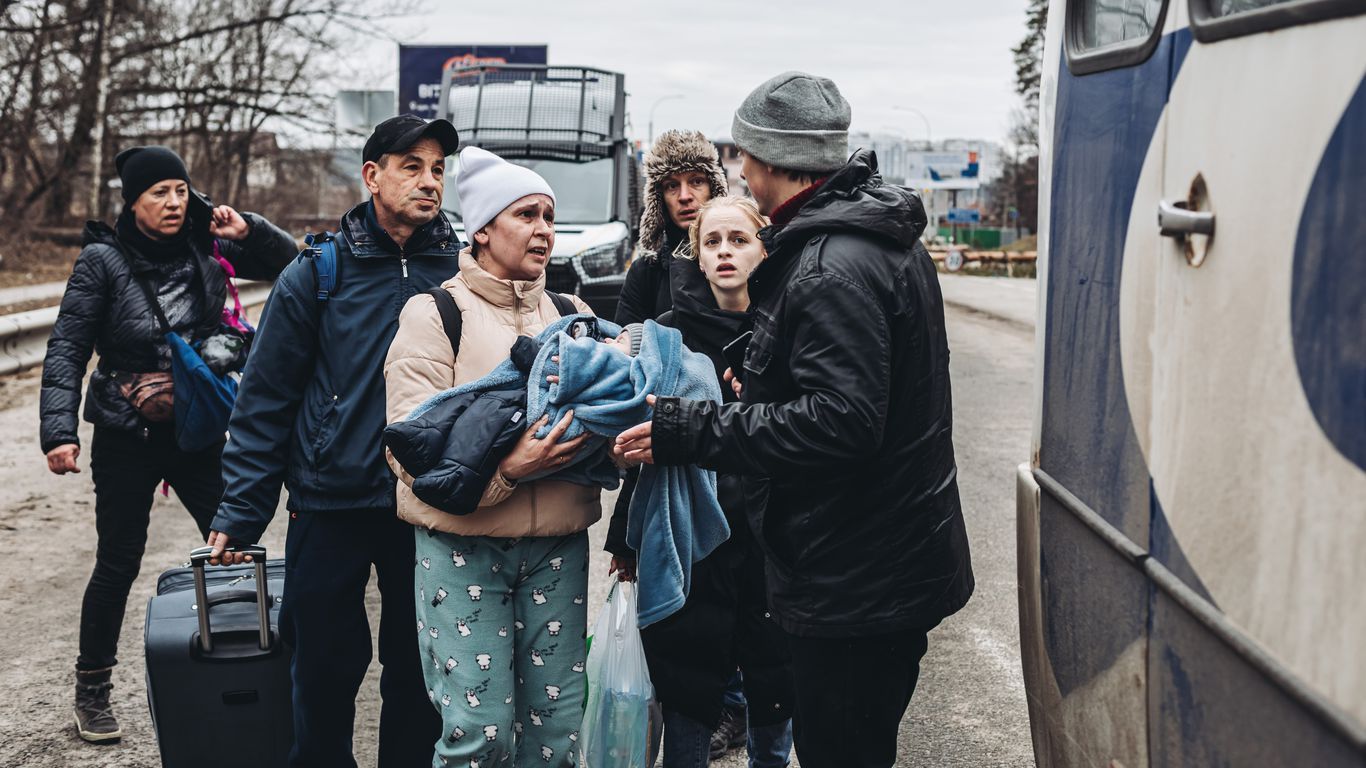
People with children wait to cross the Irpin river near Kyiv as Russian shelling intensifies in and around the capital. Photo: Diego Herrera/Europa Press via Getty Images
- March 6: The UN says the number of refugees fleeing Ukraine topped 1.5 million in 10 days, making the exodus the fastest-growing refugee crisis in Europe since World World II.
- March 7: A third round of peace talks ends with no major breakthroughs.
- March 8: Biden announces that the U.S. will ban all imports of Russian oil, natural gas and coal in response to Russia's invasion of Ukraine.
"We will not be part of subsidizing Putin’s war."
President Biden on Day 13 of Russia's invasion
- March 9: Russian shelling destroys a children's hospital that housed a maternity ward, Ukrainian officials say.
Week 3 — Biden calls Putin a "war criminal"
- March 10: Lavrov and his Ukrainian counterpart Dmytro Kuleba hold the highest-level talks since Russia's invasion began.
- March 11: Biden announces the U.S. will move to revoke Russia's "most favored nation" trade status to deliver "another crushing blow" to Moscow.
- March 12: Russian ground forces close in on Kyiv as heavy shelling continues against Ukraine's southern port city of Mariupol.
- March 13: UN agencies call for the end to Russia's attacks on health care facilities in Ukraine.
- March 14: UN Secretary-General António Guterres warns the prospect of the nuclear conflict is "within the realm of possibility" as Russia continues its invasion.
"Ukraine is on fire ... The country is being decimated before the eyes of the world."
UN Secretary-General António Guterres on Day 19 of the invasion
- March: 15: Russia sanctions Biden, Secretary of State Antony Blinken and several other U.S. officials in retaliation for sanctions against Moscow.
- March 16: Biden calls Putin a "war criminal," and announces an addition $800 million aid package, including "kamikaze" drones. Separately, Zelensky urges the U.S. Congress to do more to help Ukraine in virtual address.
"I wish for you [Biden] to be the leader of the world. Being the leader of the world means to be the leader of peace.
Zelensky says in address to Congress on Day 21 of invasion
Week 4 — Shelling of Mariupol intensifies
- March. 17: Zelensky says that Russia bombed a Mariupol theater sheltering hundreds of civilians.
- March 18: Biden and Chinese President Xi Jinping speak for nearly two hours — their first phone call since Russia's invasion began.
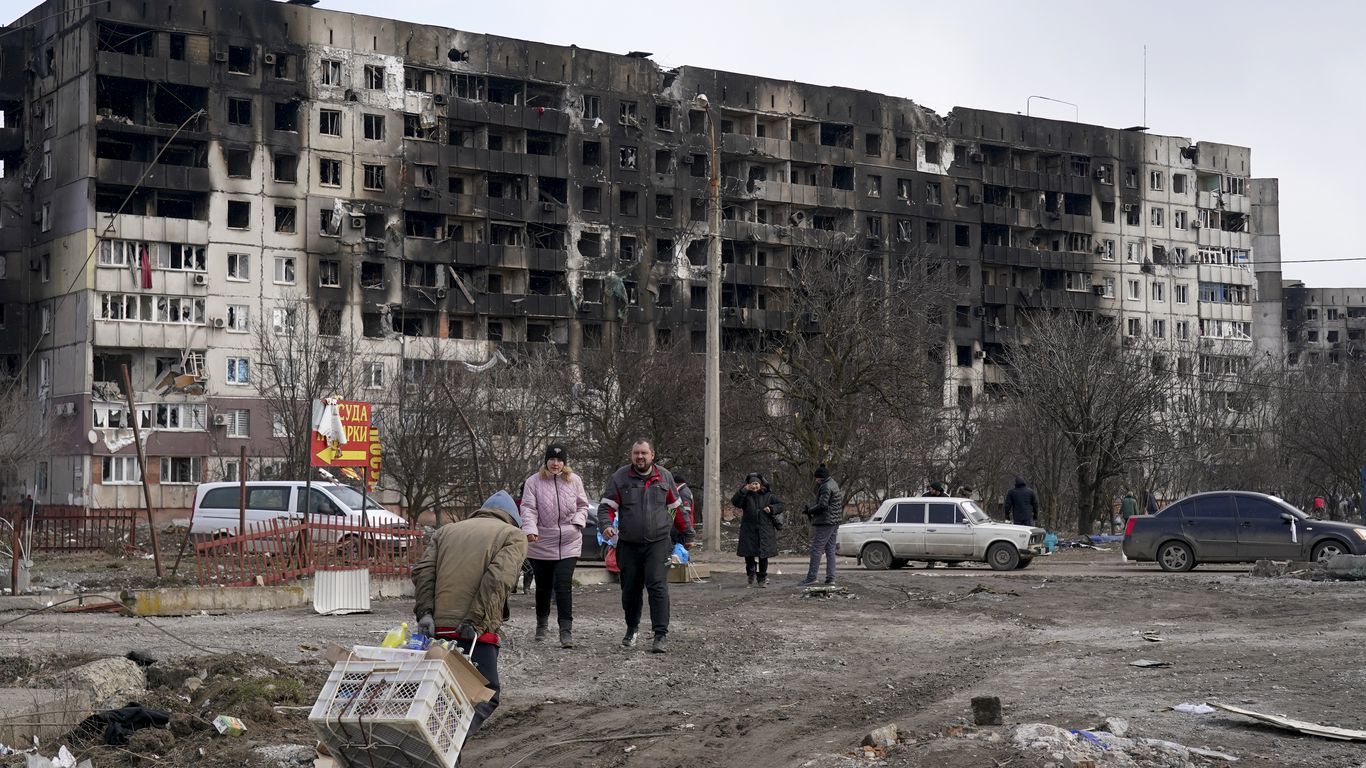
Civilians trapped in Mariupol under Russian attacks are evacuated in groups under the control of pro-Russian separatists, through other cities on March 20. Photo: Stringer/Anadolu Agency via Getty Images
- March 19: Chinese Vice Foreign Minister Le Yucheng blames NATO for the war in Ukraine and criticizes the West's sanctions against Russia.
- March 20: Ukrainian officials say an art school sheltering hundreds of civilians in Mariupol was bombed.
- March 21: Russia's Foreign Ministry summons the U.S. ambassador to Russia and hands him a note condemning what it says are Biden's "unacceptable" comments about Putin.
- March 22: Zelensky asks Pope Francis to play a "mediating role" to end Russia's aggression toward Ukraine.
- March 23: Blinken says the U.S. has assessed Russian forces are committing war crimes in Ukraine.
Week 5 — Russia announces new phase
- March 24: NATO agrees to "major increases" of troops on its eastern flank.
- March 25: Top Russian military officials say the operation in Ukraine was entering a new phase focused on the "complete liberation" of the eastern Donbas region. Separately, Ukrainian officials say at least 300 were killed in the strike that hit the Mariupol theater.
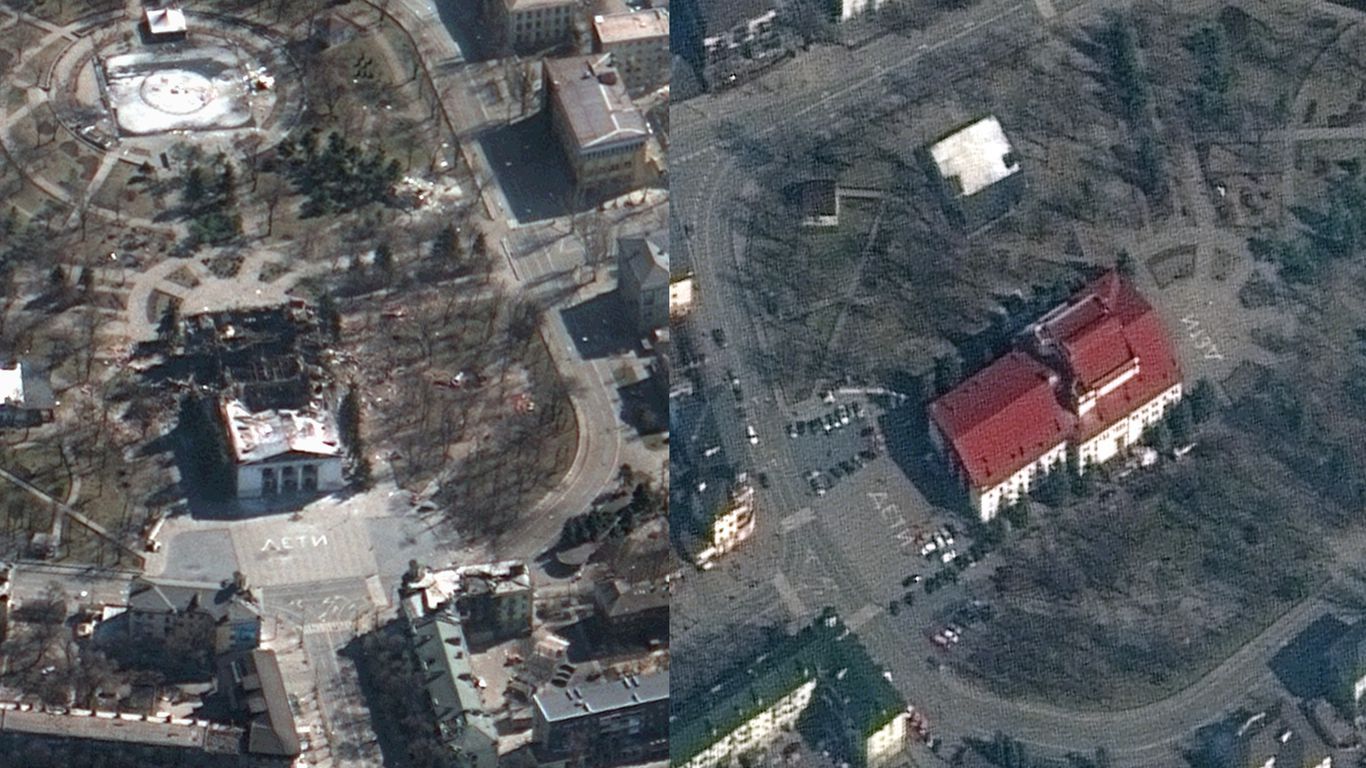
Satellite photos of the Mariupol Drama Theater from March 14 and March 19 before and after it was struck by a Russian airstrike. Photos: Maxar Technologies.
- March 26: Biden says Putin "cannot remain in power" during a speech in front of the Royal Castle in Warsaw, Poland. The White House, and Biden, later clarify he was not calling for regime change.
- March 27: Zelensky reiterates calls for the West to provide Ukraine with more planes, tanks and other weaponry.
- March 28: The mayor of Irpin says Ukrainian forces have retaken control the Kyiv suburb. Kremlin spokesperson Dmitry Peskov, meanwhile, claims Russia would only use nuclear weapons if there's a "threat for existence" to the country.
- March 29: Russia's defense ministry says it would drastically scale back military operations near Kyiv and the northern city of Chernihiv in order to "increase mutual trust" for a potential peace deal with Ukraine — though advances in both cities had already stalled. U.S. and British officials cast doubt on the claims.
- March 30: Biden announces an additional $500 million in direct budgetary aid to Ukraine. Zelensky, meanwhile, says Russia's invasion has reached a "turning point," as Russian forces launch attacks in the Donbas region while bombarding Kyiv and other key cities.
Week 6 — Bucha horrors revealed
- March 31: The U.S. imposes new sanctions on Russia's technology sector and a sanctions evasion network.
- April 1: Russia's currency, the ruble, bounces back.
- April 2: Ukrainian officials and independent photographers report bodies strewn in the streets of the Kyiv region city of Bucha, after Ukrainian forces retook the area following a Russian retreat to eastern Ukraine.
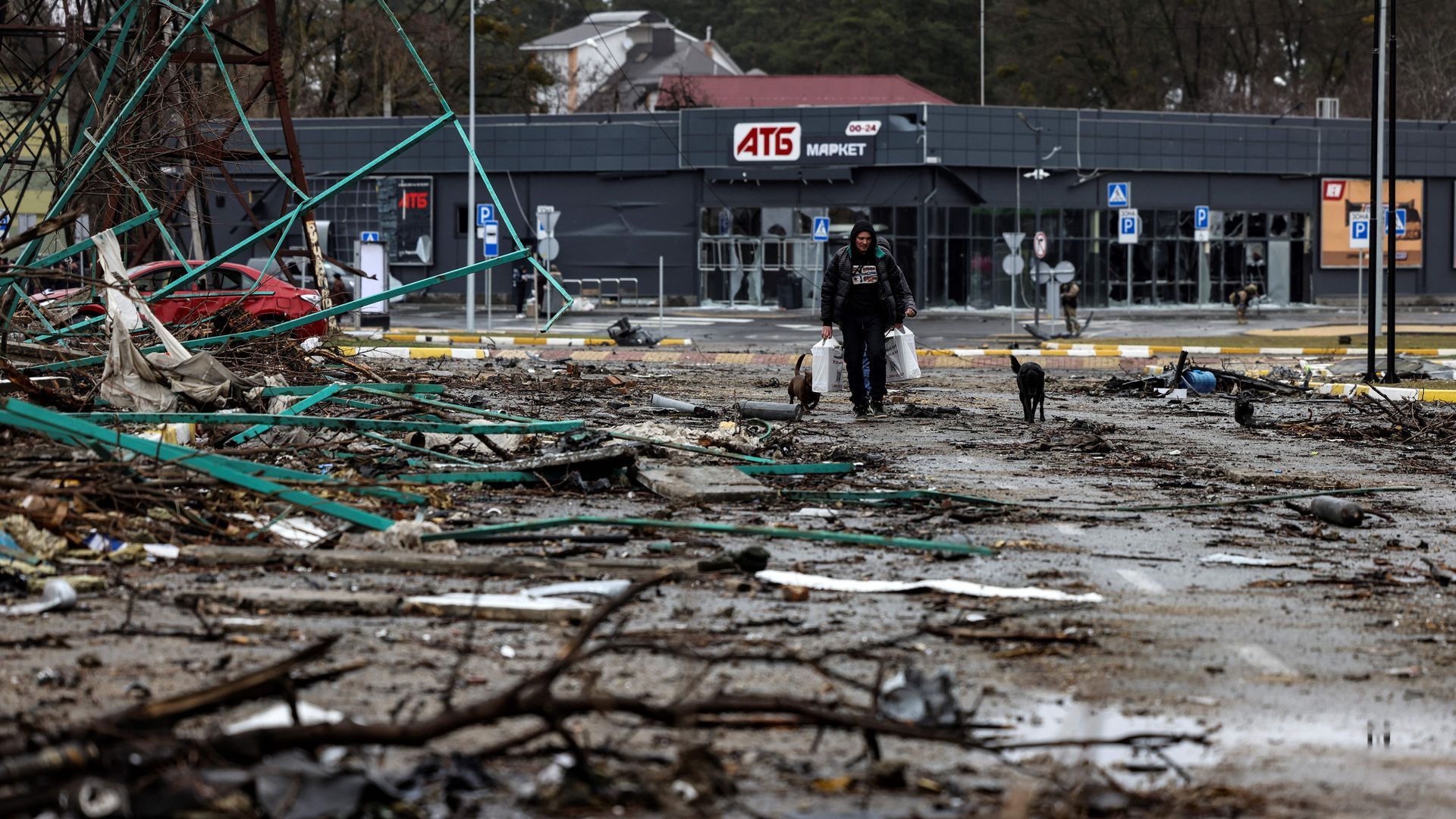
A man walks with bags of food for the Ukrainian army in Bucha, northwest of Kyiv, on April 2. Photo: Ronaldo Schemidt/AFP via Getty Images
- April 3: Zelensky denounces what he calls Russia's attempt to eliminate "the whole nation," saying, "this is genocide" after atrocities are reported in Bucha.
- April 4: Zelensky visits Bucha, and says at least 300 were killed. Separately, Biden says Putin should face a war crimes trial over Bucha.
- April 5: Sweden, Denmark, Italy and Spain expel Russian diplomats.
- April 6: The U.S., its G7 allies and the European Union say they are banning new investment in Russia and sanctioning Russia's largest bank, as well as Russian elites including Vladimir Putin's adult daughters.
Week 7 — Biden accuses Russia of committing genocide
- April 7: 93 countries vote to suspend Russia from the UN Human Rights Council over reported atrocities in Bucha and other places in Ukraine.
- April 8: Slovakia transfers an S-300 missile defense system to Ukraine. Separately, Ukrainian officials say at least 50 people were killed and nearly 100 were hospitalized after a Russian missile struck a train station in the city of Kramatorsk in eastern Ukraine. Zelensky also says the situation in the city of Borodyanka is "much worse" than Bucha.
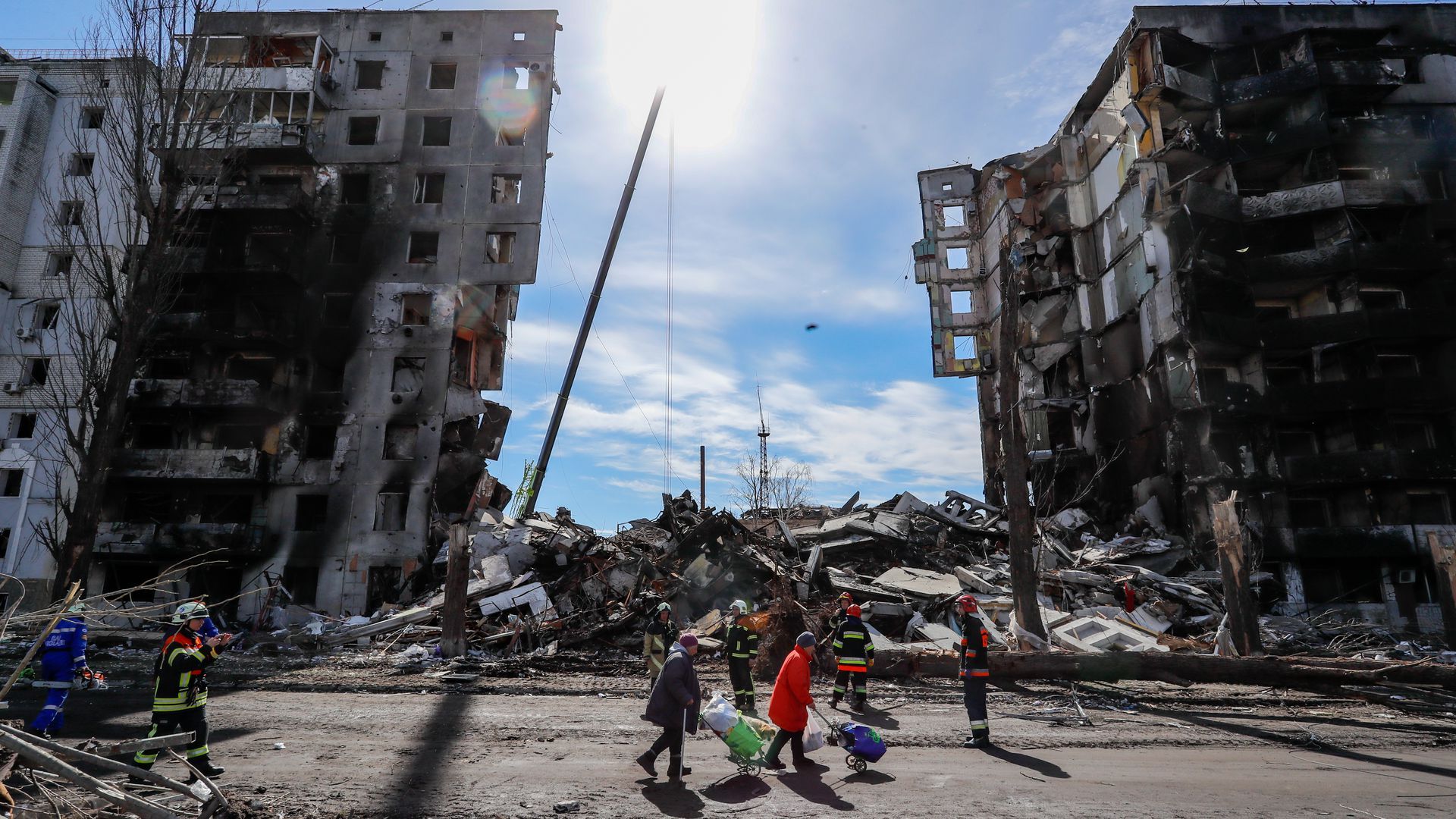
Local residents walk past a residential building damaged by the Russian air raids in Borodyanka, Ukraine, on April 7. Photo: Ceng Shou Yi/NurPhoto via Getty Images
- April 9: U.K. Prime Minister Boris Johnson makes a surprise visit to Kyiv o meet with Zelensky "in a show of solidarity with the Ukrainian people."
- April 10: Ukrainian Foreign Minister Kuleba says Germany and France made a "strategic mistake" when they previously opposed Ukraine's admission to NATO.
- April 11: France announces it sent crime scene and forensic experts to help investigate possible war crimes in parts of Ukraine previously occupied by Russian forces, including Bucha.
- April 12: Putin says war will continue "until its full completion." Biden accuses Russia of committing genocide in Ukraine.
"Yes, I called it genocide, because it’s become clearer and clearer that Putin is just trying to wipe out even the idea of being Ukrainian, and the evidence is mounting."
Biden on Day 48 of Russia's invasion
- April 13: The Kremlin accuses the U.S. of hypocrisy over Biden's genocide comments.
Week 8 - Large-scale Donbas offensive begins
- April 14: Russia says its Moskva cruiser, the flagship of its Black Sea fleet, has sunk. The Pentagon later says Ukraine sunk the ship.
- April 15: A Kyiv regional police chief tells reporters that the bodies of more than 900 civilians were found in the region after Russia forces withdrew.
- April 16: Russian forces launch attacks on Kyiv, western Ukraine and the rest of the country.
- April 17: Zelensky stresses the importance of the forthcoming fight for the Donbas region of eastern Ukraine.
"This battle — and it can happen, so there will be several battles and we don't know how long it is going to take — can influence the course of the whole war."
Zelensky on Day 53 of Russia's invasion
- April 18: Ukrainian officials say at least seven people were killed and 11 were injured after Russian missile strikes hit Lviv in western Ukraine.
- April 19: Biden says U.S. will send more weapons to Ukraine as Russia begins its large-scale offensive in eastern Ukraine.
- April 20: Germany will stop importing oil from Russia by the end of this year, German Foreign Minister Annalena Baerbock says.
Week 9 — U.S. officials visit Kyiv
- April 21: Biden announces another $800 million in military aid for Ukraine, including heavy artillery, bringing the total U.S. military aid since the invasion began to about $3.4 billion.
- April 22: The UN is seeing growing evidence of war crimes in Ukraine as a "horror story" of human rights violations unfolds, UN human rights chief Michelle Bachelet warns.
- April 23: Ukrainian officials say Russian forces killed at least eight people, including a 3-month-old baby, in missile strikes on the Black Sea port city of Odessa.
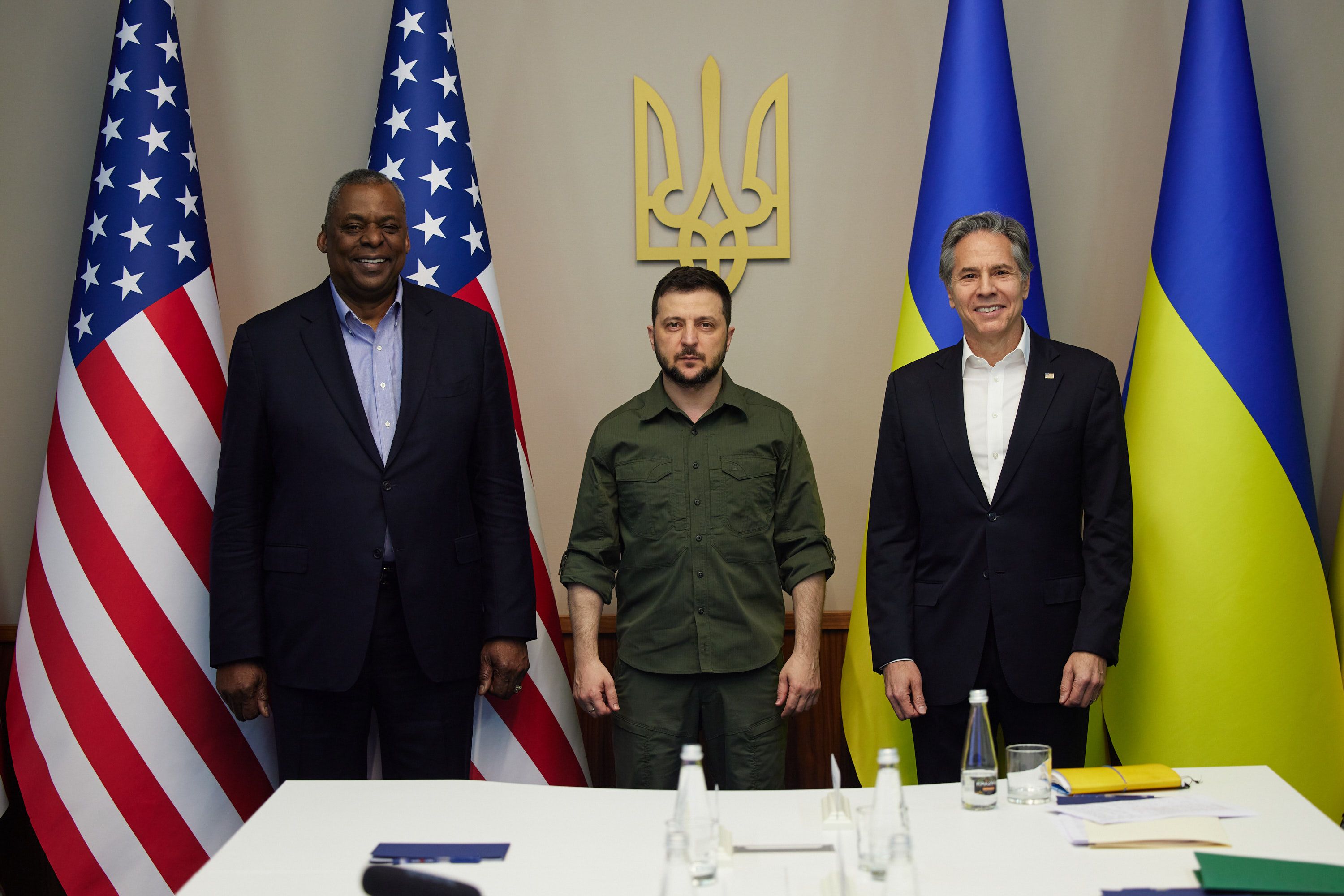
Austin and Blinken meet Zelensky in Kyiv on April 24. Photo: Handout/ Ukrainian Presidential Press Office via Getty Images
- April 24: U.S. Secretary of State Blinken and Defense Secretary Lloyd Austin meet with Zelensky in Kyiv.
- April 25: Austin says the U.S. would like to see Russia's military "weakened to a degree."
- April 26: U.S. diplomats return to Ukraine for the first time since the invasion began.
- April 27: Biden says former U.S. Marine Trevor Reed, who has been detained in Russia since 2019, has been released. Separately, Russia's majority state-owned energy company Gazprom announces it has "fully" cut gas supplies to Poland and Bulgaria.
Week 10 — Civilians evacuate Mariupol steel plant
- April 28: Prosecutors in Ukraine file first criminal charges against 10 Russian soldiers accused of war crimes in Bucha. Russia, meanwhile, strikes Kyiv as UN Secretary-General Guterres visits the city for a meeting Ukrainian officials.
- April 29: U.S. defense officials say Russian forces appear to be "several days behind where they wanted to be" in their latest assault on Ukraine's Donbas region.
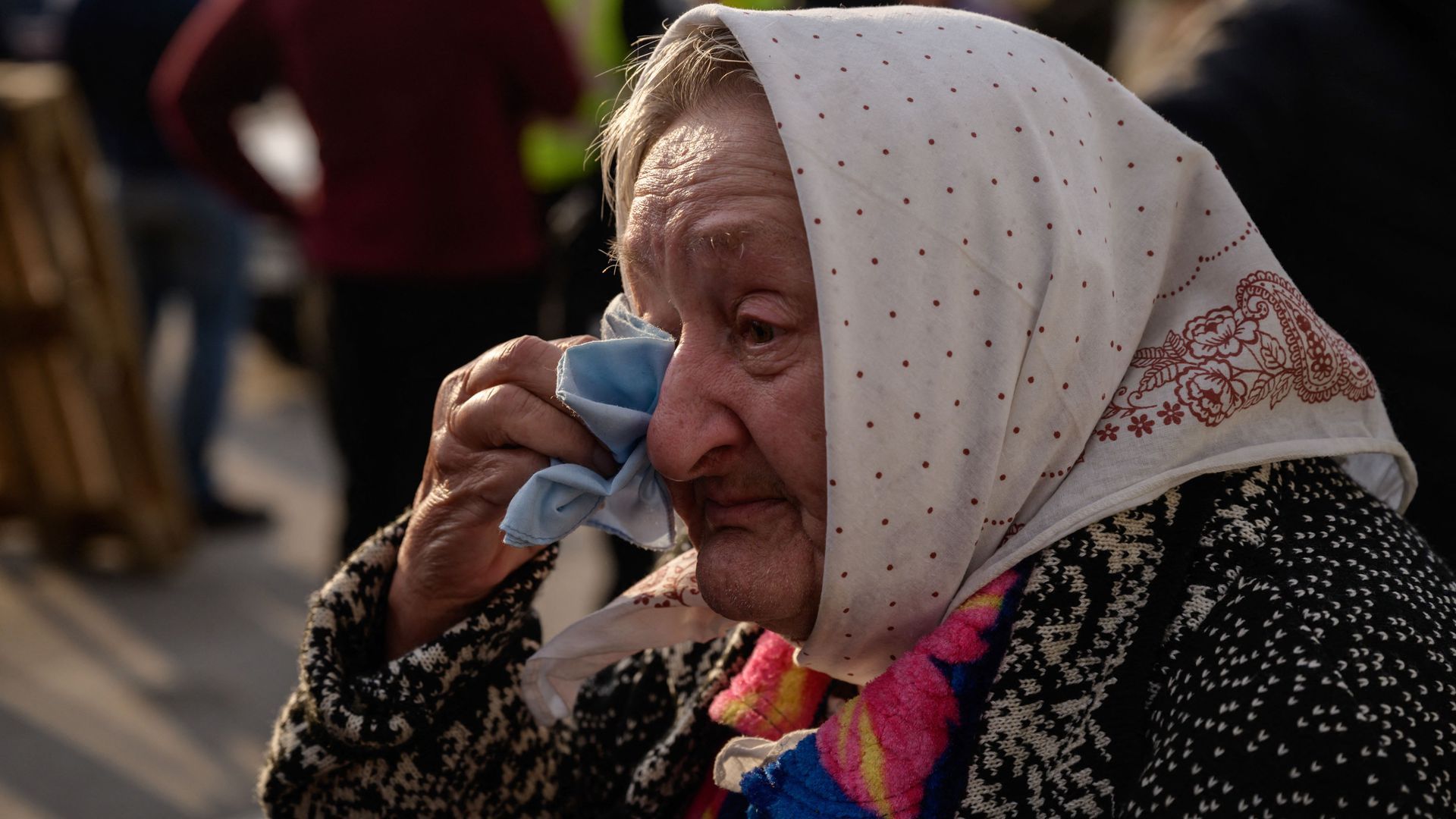
A woman who fled Mariupol reacts as she arrives in a private vehicle at a registration and processing area for internally displaced people in Zaporizhzhia, Ukraine, on May 2. Photo: Ed Jones/AFP via Getty Images
- April 30: Evacuations from Mariupol steel plant begin.
- May 1: House Speaker Nancy Pelosi (D-Calif.) leads a congressional delegation to meet with Ukrainian President Volodymyr Zelensky in Kyiv.
- May 2: Mariupol residents describe terrifying life under Russia's onslaught.
"You just can't imagine what we have been through — the terror."
Natalia Usmanova, who evacuated the Mariupol steel plant, tells Reuters.
- May 3: The first evacuees from the besieged Azovstal steel plant in Mariupol arrive in the Ukrainian-controlled city of Zaporizhzhia after a "harrowing journey."
- May 4: The European Commission announces plans for a phased ban on all Russian oil by the end of the year.
Week 11 — "Victory Day" escalation fears
- May 5: UN Secretary-General António Guterres calls the war "senseless in its scope, ruthless in its dimensions and limitless in its potential for global harm."
"We must continue to do all we can to get people out of these hellscapes,"
UN Secretary-General António Guterres on Day 71 of the war
- May 6: Zelensky says Ukraine will only reenter peace talks with Russia if the Kremlin guarantees the restoration of pre-invasion borders and returns thousands of Ukrainians who were forcefully evacuated to Russia.
- May 7: Ukrainian officials say all women, children and elderly people have been evacuated from the Azovstal steel plant in Mariupol.
- May 8: The U.S., G7 and European Union agree to impose sweeping new sanctions on Russia ahead of its symbolic Victory Day holiday, including additional export controls and a commitment to phase out Russian oil.
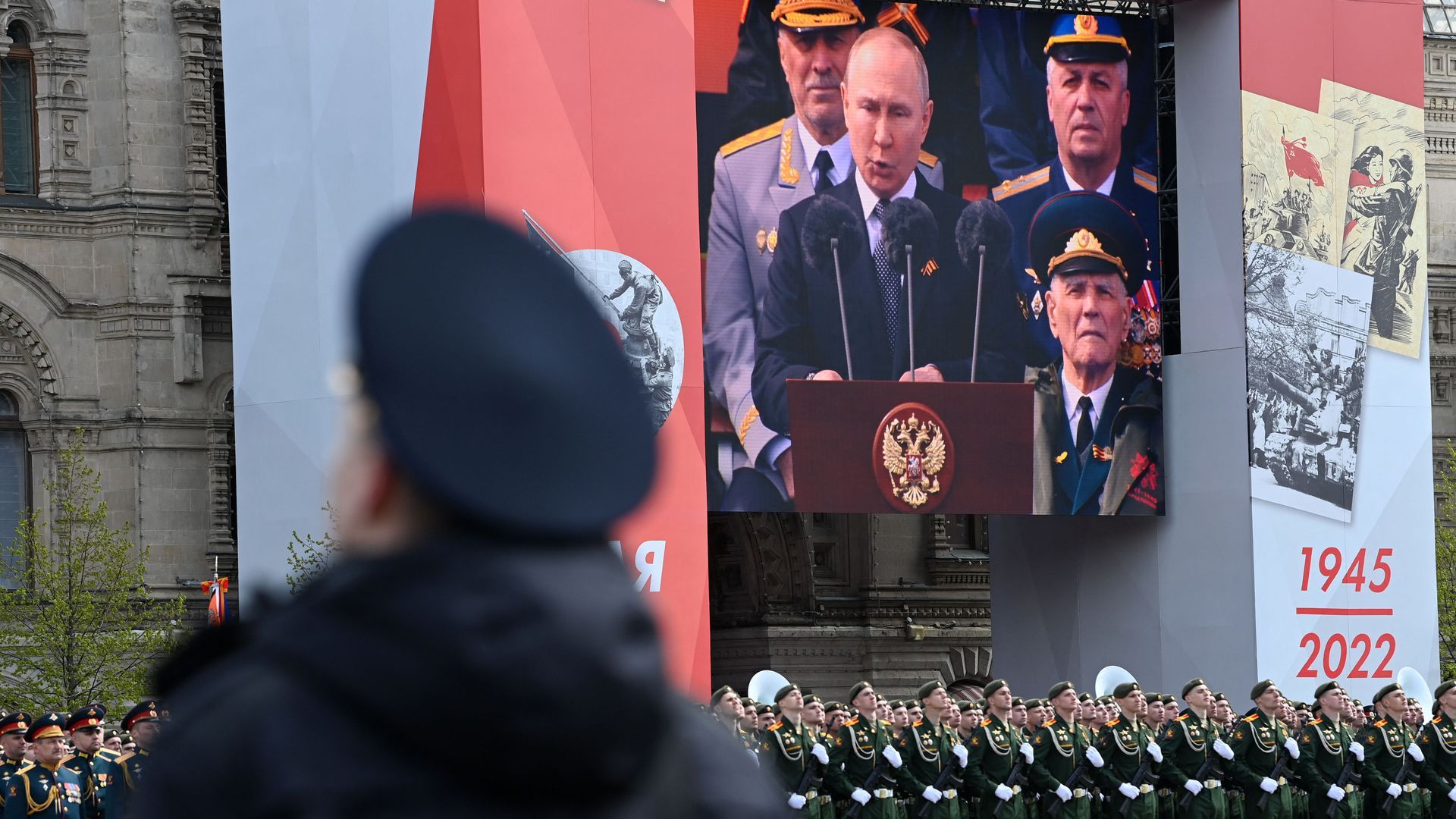
A screen shows Russian President Vladimir Putin giving a speech as servicemen line up on Red Square during the Victory Day military parade in central Moscow on May 9. Photo: Kirill Kudryavtsev/AFP via Getty Images
- May 9: Putin rails against NATO and tries to justify the invasion in a speech marking "Victory Day" in Russia. The day largely passes, however, without the escalation that many Western officials feared.
- May 10: U.S. Director of National Intelligence Avril Haines tells a Senate committee that the U.S. intelligence community assesses Russia is preparing for a "prolonged conflict" in Ukraine that is likely to become "more unpredictable and escalatory" due to a "mismatch" between Putin's ambitions and military capabilities.
- May 11: Ukraine announces that a soldier accused of killing a civilian will be the first Russian service member to stand trial on war crimes charges since the start of the war
Week 12 - Finland, Sweden apply for NATO membership
- May 12: The number of refugees who have fled Ukraine since the start of war reaches 6 million, the UN says.
- May 13: Secretary of Defense Austin calls for an immediate cease-fire in his first call with Russian Defense Minister Sergei Shoigu since the invasion began.
- May 14: G7 countries demand Russia end its "illegal war of aggression" and say they will never recognize altered borders stemming from Russia's invasion in Ukraine.
- May 15: Secretary of State Blinken meets with NATO allies and senior Ukrainian officials in Berlin.
- May 16: Sweden's Prime Minister Magdalena Andersson announces that her government will formally apply to join NATO, paving the way for the Scandinavian country to submit a joint bid this week with its strategic ally and neighbor Finland.
Data: NATO; Map: Thomas Oide/Axios
- May 17: The ICC announces it has sent 42 experts to Ukraine — its "largest ever" single field deployment — to investigate alleged war crimes.
- May 18: Finland and Sweden formally apply for NATO membership. (Turkey has voiced opposition to their membership, claiming the Nordic countries are home to Kurdish "terrorist organizations.")
Week 13 — Ukraine rules out territory concessions
- May 19: U.S. Congress approves $40 billion aid package for Ukraine.
- May 20: G7 countries say they will provide nearly $20 billion in financial aid for Ukraine.
- May 21: Biden signs a $40 billion aid package for Ukraine.
- May 22: Ukrainian presidential adviser Mykhailo Podolya tells Reuters Ukraine will not agree to a cease-fire or any territorial concessions to Russia because doing so would only embolden the latter to ramp up its attacks.
- May 23: A Ukrainian court sentences a 21-year-old Russian soldier to life in prison for committing war crimes.
- May 24: Zelensky tells Axios' Jonathan Swan he is no longer so eager to meet with Putin.
"We cannot avoid this meeting with the president of the Russian Federation, but after the atrocities that they committed, I cannot be too excited about such a meeting or meetings with the intermediaries."
Zelensky tells Axios on Day 90 of the war
- May 25: The UN says it has recorded nearly 4,000 civilian deaths, including 259 children, since the invasion began. But it warns the actual a toll is much higher.
Week 14 - Russia makes progress in Donbas
- May 26: The Russian military assault on Severodonetsk has left some 1,500 people dead and destroyed 60% of buildings, the eastern Ukrainian city's mayor says.
- May 27: Leaders of Ukraine's Orthodox Church declare independence from the Russian Orthodox Church over its support of the Kremlin's invasion.
- May 28: Russia intensifies its heavy assault in eastern Ukraine, including on the city of Severodonetsk.
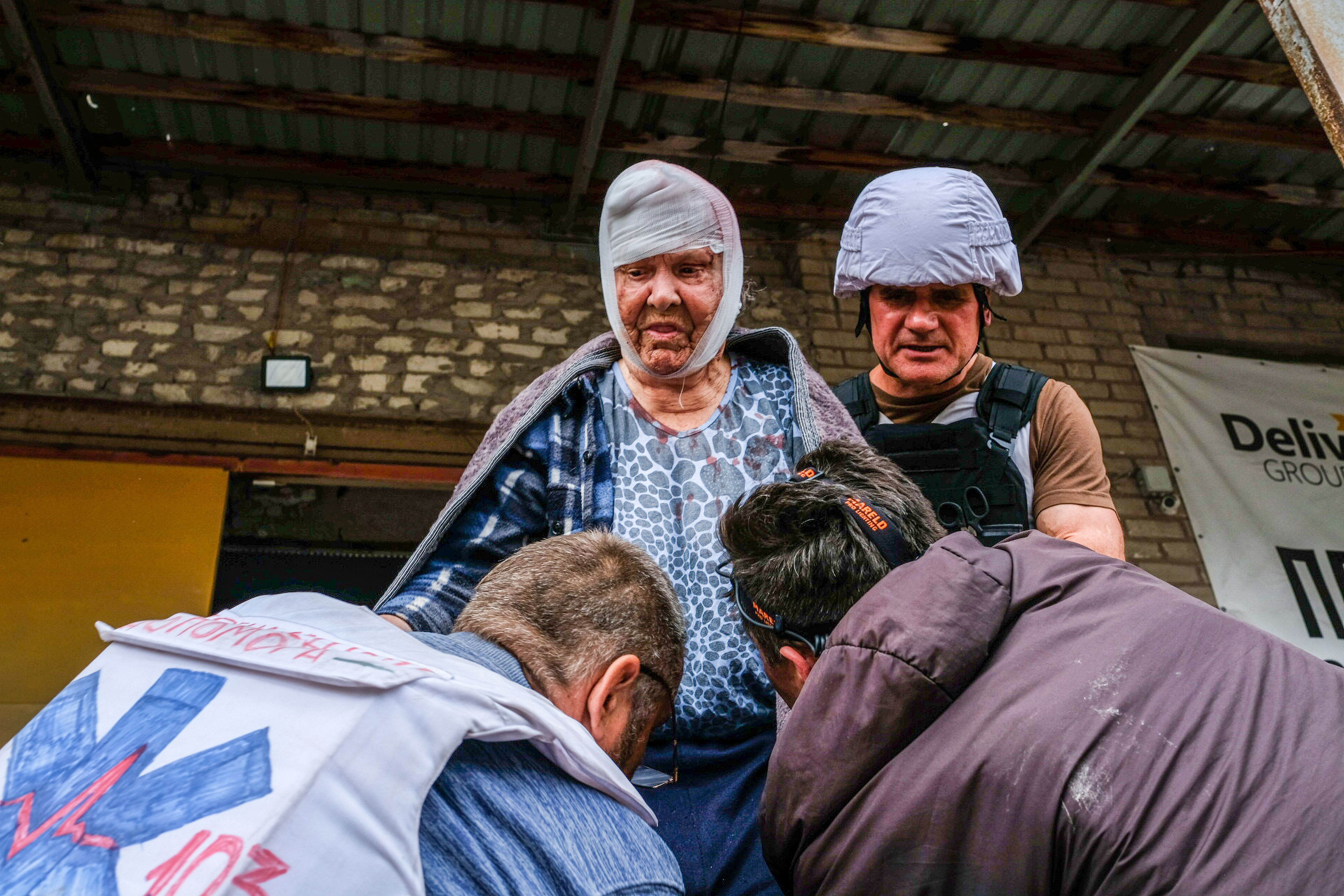
Volunteers carry a woman injured by the Russian shelling in Severodonetsk. Photo: Rick Mave/SOPA Images/LightRocket via Getty Images
- May 29: Zelensky visits the northeastern city of Kharkiv as Russian forces continue their bombardment of eastern Ukraine.
- May 30: EU leaders agree to block most Russian oil imports.
- May 31: Biden says the U.S. will provide Ukraine with more advanced rocket systems and munitions.
- June 1: Russia accuses the U.S. of deliberately escalating the war by deciding to send longer-range missile systems to Ukraine. Separately, UNCIEF says more than 260 children have died in the war since it began.
Week 15 - War reaches Day 100
- June 2: The U.S. Treasury Department unveils news sanctions on targeting the network of individuals and entities that enable Kremlin elites to anonymously use their money abroad and make use of their luxury assets.
Data: The Institute for the Study of War with AEI’s Critical Threats Project; Map: Jared Whalen/Axios
- June 3: The war in Ukraine reaches the 100th day.
Go deeper:
- 🎧 Listen to the Axios podcast, How It Happened, which has been telling the story of this conflict since it began.
- Axios Explains: Ukraine







